This is an overview of 1925 in film, including significant events, a list of films released and notable births and deaths.

Morning Glory is a 1933 American Pre-Code drama film which tells the story of an eager would-be actress and her journey to stardom, and her gains and losses. The picture stars Katharine Hepburn, Douglas Fairbanks Jr., and Adolphe Menjou, was adapted by Howard J. Green from a then-unproduced stage play of the same name by Zoë Akins, and was directed by Lowell Sherman. Hepburn won her first Academy Award for Best Actress for this movie. Morning Glory was remade in 1958 under the title Stage Struck.
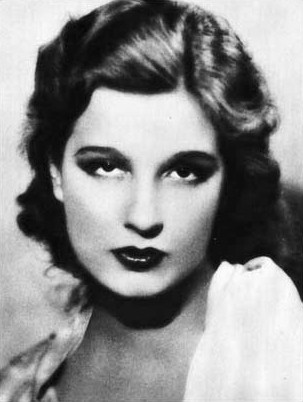
Lili Damita was a French-American actress and singer who appeared in 33 films between 1922 and 1937.

Arsenic and Old Lace is a play by American playwright Joseph Kesselring, written in 1939. It has become best known through the 1944 film adaptation starring Cary Grant and directed by Frank Capra.
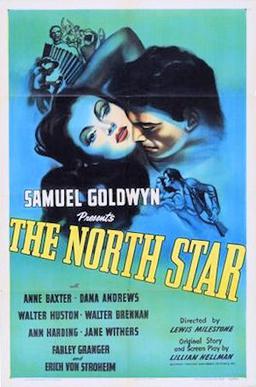
The North Star is a 1943 pro-resistance war film starring Anne Baxter, Dana Andrews, Walter Huston, Walter Brennan and Erich von Stroheim It was produced by Samuel Goldwyn Productions and distributed by RKO Radio Pictures. It was directed by Lewis Milestone, written by Lillian Hellman and featured production design by William Cameron Menzies. The music was written by Aaron Copland, the lyrics by Ira Gershwin, and the cinematography by James Wong Howe. The film also marked the debut of Farley Granger.

Stage Struck is a 1958 American drama film directed by Sidney Lumet and starring Henry Fonda, Susan Strasberg and Christopher Plummer in his film debut. The screenplay, by Augustus and Ruth Goetz, is based on the stage play Morning Glory by Zoë Akins, which also served as the basis for the 1933 film Morning Glory starring Katharine Hepburn, Douglas Fairbanks Jr. and Adolphe Menjou in corresponding roles.
Friends & Lovers may refer to:
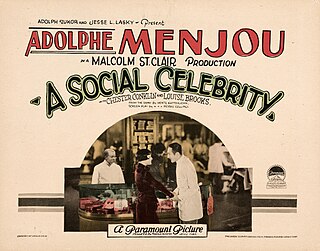
A Social Celebrity is a 1926 American silent comedy drama film directed by Malcolm St. Clair and starred Louise Brooks as a small town manicurist who goes to New York City with her boyfriend, a barber who poses as a French count. The film is now considered lost.

That's Right – You're Wrong is a 1939 American musical film directed by David Butler and released by RKO Radio Pictures. The film stars Kay Kyser and his band, with a cast that included Adolphe Menjou, Lucille Ball, Edward Everett Horton, Roscoe Karns, and Ginny Simms. It was the first film to feature Kyser and his band, and its success led to their headlining several more pictures over the next five years. The title was a Kyser catchphrase, used on his radio show when a contestant correctly gave a wrong answer to a "right or wrong" question.
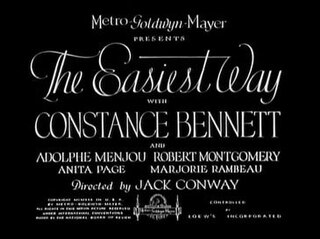
The Easiest Way is a 1931 American pre-Code MGM drama film directed by Jack Conway. Adapted from the 1909 play of the same name written by Eugene Walter and directed by David Belasco, the film stars Constance Bennett, Adolphe Menjou, Robert Montgomery, Marjorie Rambeau, Anita Page, and Clark Gable

Westward Passage is a 1932 American pre-Code drama film directed by Robert Milton and starring Ann Harding, Laurence Olivier, ZaSu Pitts and Irving Pichel. The screenplay concerns a woman who falls in love and marries, but soon discovers how unpleasant her new husband is. The film marked Olivier's second major role in the United States. It was not a commercial or critical success, and Olivier did not make another film in America until 1939 when he starred in Wuthering Heights. The film recorded a loss of $250,000.

The Lost Squadron is a 1932 American pre-Code drama, action, film starring Richard Dix, Mary Astor, and Robert Armstrong, with Erich von Stroheim and Joel McCrea in supporting roles, and released by RKO Radio Pictures. Based on the novel The Lost Squadron (1932) by Dick Grace, the film is about three World War I pilots who find jobs after the war as Hollywood stunt fliers.
Let Us Be Gay is a 1930 American pre-Code romantic comedy-drama film produced and distributed by MGM. It was directed by Robert Z. Leonard and stars Norma Shearer. It was based on and filmed concurrently with the 1929 play by Rachel Crothers which starred Tallulah Bankhead and ran for 128 performances at London's Lyric Theater. Critics generally preferred Tallulah's rendition to Shearer's.
The Woman on the Rack is a 1928 German silent drama film directed by Robert Wiene and starring Lili Damita, Vladimir Gajdarov, and Johannes Riemann. It was also known by the alternative title A Scandal in Paris. It was based on a British play by Edward Hemmerde and Francis Neilson. The wife of a British aristocratic politician, who is neglected by her husband, resists an attempt to break them up. When her husband discovers what he mistakenly believes to be a dalliance with another man he begins divorce proceedings. Eventually the truth comes out and the couple reconcile. The film was not considered one of Wiene's greatest achievements, but he was praised for directing with his usual competence while Damita's performance as Lady Admaston was hailed.

Conspiracy is a 1930 American pre-Code mystery melodrama film produced and distributed by RKO Pictures and directed by Christy Cabanne. It is the second adaptation of the play The Conspiracy by Robert B. Baker and John Emerson and stars Bessie Love and Ned Sparks.
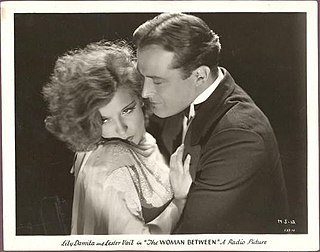
The Woman Between is a 1931 American pre-Code drama film directed by Victor Schertzinger and written by Howard Estabrook. The film stars Lili Damita, Lester Vail, O.P. Heggie, Miriam Seegar and Anita Louise. It was released on August 8, 1931 by RKO Pictures.
Louis Sarecky was an American film producer and screenwriter at the very beginning of the sound era of motion pictures. Born in 1886 in Odessa in what was then the Russian Empire, he began his career in the last year of silent film, 1928, working on five films that year, four as screenwriter and one as producer. While he is only credited with working on 26 films, some of those were among the most popular films at that time: The Vagabond Lover (1929), Rudy Vallée's screen debut; The Cuckoos, starring the comedy team of Wheeler & Woolsey; and Friends and Lovers in 1931, starring Adolphe Menjou and Laurence Olivier. His crowning achievement would be the Academy Award-winning 1931 film Cimarron. Sarecky was the associate producer on the film, as well as helping adapt the screenplay, although he was uncredited for the latter. Since the film won the Oscar for both outstanding production and best adapted screenplay, he would have the dubious distinction of contributing in both those fields, yet not receiving an Academy Award himself.
A Kiss in the Dark is a 1925 American silent comedy film directed by Frank Tuttle and written by Townsend Martin based upon a novel by Frederick Lonsdale. The film stars Adolphe Menjou, Aileen Pringle, Lillian Rich, Kenneth MacKenna, Ann Pennington, Kitty Kelly, and Zeppo Marx. The film was released on April 6, 1925, by Paramount Pictures.
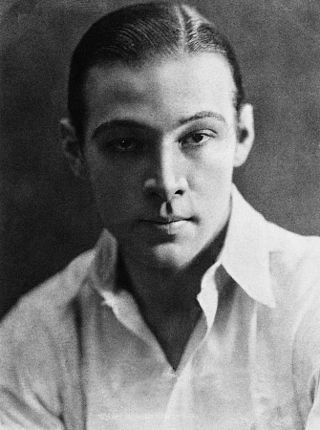
Latin lover is a stereotypical stock character, part of the Hollywood star system. It appeared for the first time in Hollywood in the 1920s and, for the most part, lost popularity during World War II. In time, the type evolved, developing various local variants and gradually incorporating attributes other than the originally defining physical characteristics.

A Man Has Been Stolen is a 1934 French comedy thriller film directed by Max Ophüls and starring Lili Damita, Henri Garat and Raoul Marco.














